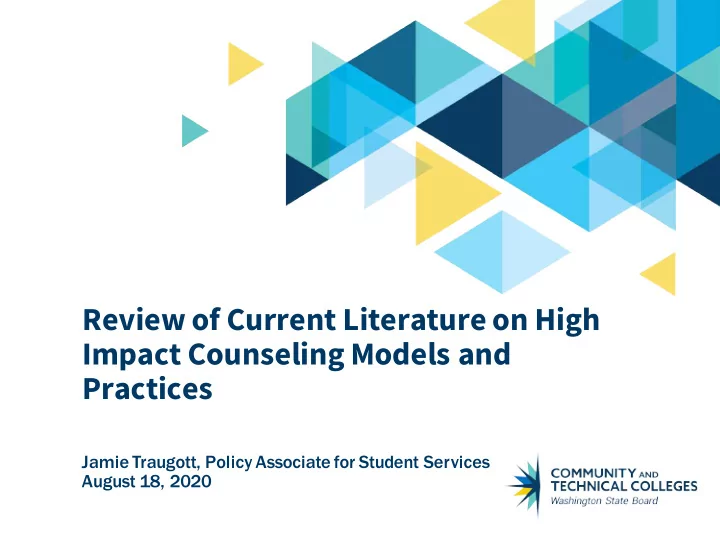

Review of Current Literature on High Impact Counseling Models and Practices Jamie Traugott, Policy Associate for Student Services August 18, 2020
Resource #1 American College Counseling Association. (2013). Community college taskforce survey of community 2-year college counseling services. The American College Counseling Association's (ACCA) Community College Task Force (CCTF) 3 rd national survey results. The purpose of this survey is to gather benchmark data about common practices for personal/mental health counseling in community/2 Year colleges as well as establishing a baseline of the percentage of counselors also offering career counseling. 198 Community/2 Year Colleges from 43 different states from 2012-2013 were represented in this survey.
Key Takeaways 72% of colleges have trained counselors providing career counseling. • 78% of respondents hold Master’s Degrees. • 51% hold licensure as an LMHC/LPC or equivalent and 18% hold no license. • 28% are National Certified Counselors. • 62% offer suicide prevention programming or resources. • 78% report having a Threat Assessment Team on campus. • 98% have regular duties/roles in addition to personal counseling. • Committee work (80%),Career counseling (62%), Academic advising (57%) • Psychoeducational Programming (64%)
Key Takeaways 2 The top 4 student presenting problems are: Depression, Anxiety • disorders, Stress, Relational issues Counselors often “wear too many hats” and suffer from role overload. • Referring students to off-campus services tends to be problematic due • to college policies, student health insurance, and lack of community resources. There is also a perceived increase in students lacking access to social services. Many Counseling Centers are providing a variety of services to students • and have limited time for Personal Counseling. Counselors often “wear too many hats” and suffer from role overload. • https://www.insidehighered.com/sites/default/server_files/files/ACCA%20CCTF%202012- 2013%20Survey%20FINAL.PDF
Research #2 NASPA Policy and Practice Series (2020). Strategies for addressing mental health supports on campus. The purpose of this issue of Policy and Practice offers counselors and student affairs professionals strategies to effectively support the mental health needs of today’s students. This brief overviews relevant federal legislation and liability concerns, highlights trends in counseling center practices, and offers recommendations for campus mental health policies and practices. Key Takeaways- Effective college and university approaches should be grounded in a common set of guiding principles.
Guiding Principles Clearly Define the Scope of Services Transparent communication of what type of counseling services are • available to students. Determining an appropriate scope of care requires consideration of many factors, including the campus context and values, and the needs of students Provide No-Wrong-Door Access to Care A counseling centers should be designed in a way that leads students, • regardless of entry point, to appropriate services and care (Mowbray et al., 2006). Ensuring that areas of campus that primarily support students are • receiving effective and ongoing training for how to identify, support, and assist students in accessing appropriate mental health supports and resources.
Guiding Principles Cont. Leveraging Student Voices Students should be integrated into as much of the decision making • processes related to mental health support services as possible. Some institutions directly involve students in counseling center • strategic planning as well as outreach strategy design. Student-led mental health clubs, committees, and advisory • boards can facilitate peer-to-peer and student-to-staff communication. https://www.naspa.org/images/uploads/main/NASPA_Policy_and_Practice_Issue_4_Mental_ Health_DOWNLOAD.pdf
Research #3 Nutt, A. (2018, June 28). College students are forming mental-health clubs — and they’re making a difference. The Washington Post . The purpose of this article is to highlight current research on the effectiveness of utilizing student voices and peer led activities to promote an inclusive mental health culture on campus and encourage more students to seek services on campus. During the 2016-2017 academic year, asked 1,100 California university and community college students about their familiarity with Active Minds as well as their attitudes about mental health and experiences with psychological difficulties, either their own or those of others.
Key Takeaways 3 “Starting a conversation about mental health on a student-to-student • level could change our approach to mental health, change the landscape and climate,” Malmon said. “Now we have the data to prove it.” Researchers found that student peer organizations can play an • important role in shifting the campus culture towards mental health and in supporting students getting to the mental health services they need. Student led mental health activities and organizations increased • awareness of mental-health issues for students. Additionally, they found an increase in students seeking mental health services.
Additional Resources Active Minds - nonprofit organization dedicated to supporting mental health awareness https://www.activeminds.org/ https://www.activeminds.org/programs/active-minds-california/ Campus Mental Health Action Planning Guide http://www.jedfoundation.org/wp-content/uploads/2016/07/campus-mental-health-action- planning-jed-guide.pdf College Counseling Literature and Annotated Bibliography http://www.collegecounseling.org/resources/CCAPS%20Knowledge%20Base/College%20Cou nseling/ACCA%20Database%20CollCouns%20Overview.pdf College Student Mental Health Survey-2019 https://www.higheredtoday.org/2019/08/12/college-student-mental-health-well-survey- college-presidents/ College Counseling from a Distance http://www.collegecounseling.org/resources/Resources/HEMHA%20Distance%20Counseling_ FINAL.pdf
Additional Resources Cont. Cultural Competency Tools and Recommendations for College Counselors https://www.counseling.org/news/aca-blogs/aca-member-blogs/aca-member- blogs/2019/01/03/why-cultural-competence-matters. Inconsistent Mental Healthcare at Community Colleges https://www.insightintodiversity.com/inconsistent-mental-healthcare-at-community- colleges-harms-a-vulnerable-student-population Kognito-providing virtual tools for professional development training in mental health for K-12 and higher ed professionals https://kognito.com/about Suicide Prevention Best Practices http://www.sprc.org/faqs-best-practices- registry#:~:text=The%20Best%20Practices%20Registry%20%28BPR%29%20was%20a%20sect ion,content%20had%20been%20reviewed%20according%20to%20specific%20standards.
Recommend
More recommend